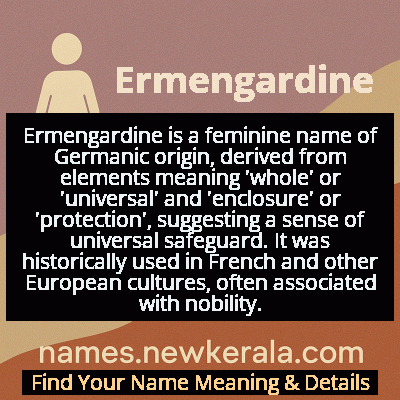Ermengardine Name Meaning & Details
Origin, Popularity, Numerology Analysis & Name Meaning of Ermengardine
Discover the origin, meaning, and cultural significance of the name ERMENGARDINE. Delve into its historical roots and explore the lasting impact it has had on communities and traditions.
Name
Ermengardine
Gender
Female
Origin
French
Lucky Number
5
Meaning of the Name - Ermengardine
Ermengardine is a feminine name of Germanic origin, derived from elements meaning 'whole' or 'universal' and 'enclosure' or 'protection', suggesting a sense of universal safeguard. It was historically used in French and other European cultures, often associated with nobility.
Ermengardine - Complete Numerology Analysis
Your Numerology Number
Based on Pythagorean Numerology System
Ruling Planet
Mercury
Positive Nature
Adventurous, dynamic, curious, and social.
Negative Traits
Restless, impatient, inconsistent, prone to indulgence.
Lucky Colours
Green, white.
Lucky Days
Wednesday.
Lucky Stones
Emerald.
Harmony Numbers
1, 3, 9.
Best Suited Professions
Sales, marketing, travel, entertainment.
What People Like About You
Versatility, charisma, adventurous spirit.
Famous People Named Ermengardine
Ermengarde of Anjou
Noblewoman and Countess
Countess of Brittany who played significant political roles in medieval French nobility and supported religious foundations
Ermengarde of Hesbaye
Frankish Queen
Wife of Louis the Pious and mother of Lothair I, playing crucial roles in Carolingian dynasty politics
Ermengarde of Tours
Holy Roman Empress
Wife of Emperor Lothair I, known for her political influence and religious patronage during the Carolingian era
Name Variations & International Equivalents
Click on blue names to explore their detailed meanings. Gray names with will be available soon.
Cultural & Historical Significance
Extended Personality Analysis
The name Ermengardine evokes personality traits of strength, dignity, and historical depth. Individuals with this name are often perceived as possessing natural authority and gravitas, carrying themselves with a sense of heritage and tradition. They typically demonstrate remarkable resilience and determination, qualities that served their historical namesakes well in navigating complex medieval politics. These individuals tend to be protective and loyal, with a strong sense of responsibility toward family, community, or causes they believe in. Their strength is balanced by diplomatic skills and cultural sophistication, allowing them to navigate social situations with grace and intelligence. The historical weight of the name suggests someone who values knowledge, tradition, and cultural continuity, often displaying wisdom beyond their years and a deep appreciation for history and legacy. Ermengardine bearers are frequently seen as pillars of strength in their communities—reliable, principled, and capable of providing guidance during challenging times. They combine practical intelligence with emotional depth, creating a personality that is both formidable and compassionate. The name suggests an individual who understands the importance of boundaries and protection while maintaining an open-minded approach to new ideas and perspectives. This balance between tradition and adaptability makes Ermengardine personalities particularly effective in leadership roles where both historical awareness and contemporary insight are valuable. Their inherent dignity and sense of purpose often inspire confidence in others, making them natural leaders and trusted advisors.
Modern Usage & Popularity
In contemporary naming practices, Ermengardine stands as an exceptionally rare and historically significant choice. The name has virtually disappeared from modern birth records, with its usage primarily confined to historical references, genealogical studies, and occasional literary appearances. However, it represents a fascinating case in the revival of vintage and aristocratic names, appealing to parents seeking unique names with deep historical roots and French noble connections. The name's complexity and distinctive sound make it a bold choice that defies current naming trends, potentially attracting those interested in medieval history, French heritage, or distinctive vintage names. While its practical usage remains minimal, Ermengardine serves as an important example of how historical names can preserve cultural memory and aristocratic traditions. The name's modern rarity adds to its distinctive appeal for parents looking for truly unique names that carry weight and history. Current usage, when it occurs, tends to be concentrated in France and among families with demonstrated connections to French nobility or strong interests in medieval history and genealogy.
Symbolic & Spiritual Meanings
Symbolically, Ermengardine represents a rich tapestry of meanings centered around protection, heritage, and feminine authority. The name's probable Germanic roots in 'ermen' (whole/universal) and 'gard' (enclosure/protection) create a powerful symbolic combination suggesting 'universal protector' or 'complete guardian.' This symbolism extends beyond literal protection to encompass the preservation of tradition, cultural values, and family legacy. The name evokes images of medieval strongholds and noble lineages, symbolizing both physical and metaphorical boundaries that define and protect what is valuable. Metaphorically, Ermengardine represents the bridge between ancient warrior traditions and refined aristocratic culture, embodying the evolution of feminine power from physical protection to diplomatic and cultural influence. The name symbolizes historical continuity and the enduring strength of tradition in the face of changing circumstances. It suggests a personality that serves as a guardian of values, a preserver of heritage, and a bridge between past and present. The symbolic weight of Ermengardine makes it particularly meaningful for those who value historical consciousness, cultural preservation, and the idea of feminine strength as both protective and nurturing. This rich symbolic landscape positions the name as representing not just an individual identity but a connection to broader historical and cultural narratives.

